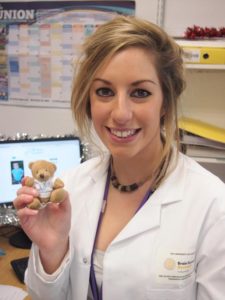Research in to Brain Tumours
![]() Introducing Emily Pinkstone MSc
Introducing Emily Pinkstone MSc

Emily joined the Brain Tumour Research Cellular and Molecular Neuro-oncology Research Group as a PhD student in November 2013.
She is conducting a functional investigation into abnormal cellular metabolism in paediatric glioblastoma, the type of brain tumour which took Ollie’s life.
Emily will be working under the supervision of Professor Geoff Pilkington at Portsmouth University and alongside the Brain Tumour Research team, on a three-year placement which has been funded by the Ollie Young Foundation.
![]() Where did the path to Portsmouth begin for you?
Where did the path to Portsmouth begin for you?
Growing up, I was never really sure what I wanted to do career-wise, but biology was the one subject which really interested me. At university my interest in the brain increased as I learned more and when I had a lecture one day about brain tumours and it was just like a light bulb went on; I knew that brain tumour research, specifically paediatric tumours, was what I wanted to do. I did my masters in neuroscience at University College London and I loved it.
Cancer charities have always been number one on my list when it comes to donating to or to support and I have done a number of fundraising events for various charities. It is so heart-breaking and so life destroying, I would do anything to do something worthwhile to help. Here in Portsmouth I always have the association with Ollie in my mind and even just reading emails from the OYF team, comments on the OYF Facebook page, telling other people about the Foundation, or sometimes even just thinking about it still makes me emotional and I think it always will. I think it is important never to lose that connection; it is the best motivation you can get. I just can’t imagine how horrible it has been for Ollie’s parents to have gone through something like that. He was such a beautiful boy.
![]() There’s another, unique connection too, isn’t there?
There’s another, unique connection too, isn’t there?

Yes, I have lived in Woodley, just down the road from Wokingham, my entire life! When I came to the lab to talk about the PhD placement and heard it was funded by the Ollie Young Foundation I went to research it all straightaway. I thought that I had heard about the charity before, although I couldn’t make the connection.
When I realised that the Foundation was based in Wokingham something clicked, and I realised I must have seen it in the newspaper or something. I just couldn’t believe it! I thought, “Wow, I know them! That’s going to be my Foundation!”
The connection couldn’t be more perfect. I have read about some wonderful fundraising for the Foundation on the web and on Facebook, in fact I look at both pretty much every day. It is amazing to see the support from everyone.
![]() Brain Tumour Research isn’t always considered to be the most attractive proposition, due to the funding issue.
Brain Tumour Research isn’t always considered to be the most attractive proposition, due to the funding issue.
Yes and that seems weird to me because it is something I am so passionate about. It is my dream job to be doing this and so I can’t imagine why anyone else would not want to do it, even to get the tiniest result, but one which is a step in the right direction.
You certainly don’t go into brain tumour research because you want the money or big recognition. It is a slow process and it can be agonisingly painful in many ways and people can work on things for years and years. But it is so much more rewarding, I think. It is great to do a job that is helping to make a difference in people’s lives.
The research being conducted here in Portsmouth is amazing. You have to break everything down into the smallest little bit and it is just so mind-boggling how, just because of that tiny little thing, something else isn’t happening, which affects something else and the impact gets bigger and bigger and bigger. But you have to work right at the molecular and cellular level to be able to get that overall clinical result. It shows how complex this whole area is and why you don’t get those instant results. But all those little pieces of research coming together will make a big impact.
![]() What is your particular line of research?
What is your particular line of research?

Specifically I am looking at how normal brain cells turn into cancerous brain cells in paediatric glioblastomas. There is a big change between how the cells metabolise when they are normal and when they are cancerous. Cells normally will use oxygen preferentially to metabolise, but when they turn cancerous, even though oxygen is available they won’t use it for some reason. It is not really understood why, so that is what I am looking at.
My hope is that from this piece of research we will learn enough to be able to move on to how the metabolism works at the cellular level. Then the next piece of research will move on a bit further to look at therapeutic targets.
It would be a dream to be able to carry the research on through in this way.
![]() You have the best mentor in Professor Geoff.
You have the best mentor in Professor Geoff.
Geoff is the number one person really, he is absolutely brilliant, he knows everything and is a member of so many boards everywhere. He is the person you want to be associated with. He is so likeable too, he always wants to chat away and tell everyone about what he is doing.
![]() How will your work be shared with the neuroscience community?
How will your work be shared with the neuroscience community?

There are lots of meetings and conferences which I will attend with information about my research and at the end of it all I will have a thesis that will be published. Through Geoff that research will also be shared on a national and international platform.
The neuro-oncology community is actually relatively small so you get to know everyone. You are doing one tiny little bit and so is everyone else so it has to be shared all round and eventually that tiny little bit becomes something that is really important.
One person cannot do everything, it has to be about teamwork with everyone coming together to share their research, that’s how you make major breakthroughs.
![]() When you aren’t busy being a neuroscientist, what do you like to do?
When you aren’t busy being a neuroscientist, what do you like to do?
I love to be active and to be outside. Skiing and snowboarding are my absolute loves. I also like climbing mountains, mountain biking and kayaking. I go to the Lake District a few times a year, which is great. I enjoy scuba diving and pilates too, the list goes on! Just being as active as possible really. I’d much rather be out climbing with my friends or skiing down a mountain than I would shopping or clubbing or anything like that! I also love spending time with my niece. She is almost two years old and getting such a great personality!
![]() Emily, it is a real milestone to see you there at Portsmouth. Good luck from everyone at the Ollie Young Foundation and all of our supporters too.
Emily, it is a real milestone to see you there at Portsmouth. Good luck from everyone at the Ollie Young Foundation and all of our supporters too.
Thank you very much to everyone at the Foundation and everyone who supports the OYF. A special thank you also goes to Ollie’s parents Simon and Sarah Young, who set up the Foundation in the hope that something positive would come out of this tragedy.
I feel as though here is where I am meant to be, doing what I am meant to be doing. I really couldn’t be happier and I am so grateful and proud to be a part of all this.


